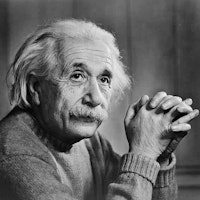The most beautiful experience one can have is the mysterious. It is the fundamental emotion that stands at the cradle of art and science.
The most beautiful experience one can have is the mysterious. It is the fundamental emotion that stands at the cradle of art and science.
Albert Einstein

The Most Beautiful Experience
Topic: Creativity, Culture, & the Arts
The most beautiful experience we can have is the mysterious. It is the fundamental emotion that stands at the cradle of true art and true science. Whoever does not know it and can no longer wonder, no longer marvel, is as good as dead, and his eyes are dimmed. It was the experience of mystery―even if mixed with fear―that engendered religion. A knowledge of the existence of something we cannot penetrate, our perceptions of the profoundest reason and the most radiant beauty, which only in their most primitive forms are accessible to our minds: it is this knowledge and this emotion that constitute true religiosity. In this sense, and only this sense, I am a deeply religious man… I am satisfied with the mystery of life’s eternity and with a knowledge, a sense, of the marvelous structure of existence―as well as the humble attempt to understand even a tiny portion of the Reason that manifests itself in nature.
Albert Einstein, born on 14 March 1879 and passing away on 18 April 1955, stands as one of the most renowned theoretical physicists in history. Best known for his groundbreaking special and general theories of relativity, his scientific endeavors spanned a multitude of areas within the field of physics. Amongst his numerous accolades, he was awarded the Nobel Prize in physics for his elucidation of the photoelectric effect—a phenomenon that expanded the horizons of quantum theory.
Einstein's journey, however, wasn't merely defined by scientific discoveries, but by the myriad challenges he overcame across various dimensions of his life. In his spiritual journey, he grappled with the concepts of God and universe. Socially, he navigated the complexities of his time—facing the rise of anti-Semitism, experiencing exile from his homeland due to Nazi oppression, and advocating for civil rights, disarmament, and global peace. These adversities only strengthened his resolve and underscored his resilience.
Beyond his professional accomplishments, Einstein's life was enriched by a tapestry of relationships and dialogues with luminaries from diverse fields. He engaged in profound conversations on the nature of reality with the likes of the Indian poet Rabindranath Tagore, discussed the principles of non-violence with Mohandas Gandhi, and deliberated on humanitarian issues with Albert Schweitzer. Furthermore, his camaraderie with fellow scientists and physicists provided a fertile ground for intellectual exchanges, fostering an environment of collaboration and innovation during one of the most exciting epochs in scientific history.
The World as I See It
Wilson, Andrew, editor. World Scripture II. Universal Peace Federation, 2011, p. 166 [Einstein, Albert, and Alan Harris. The World as I See It. Philosophical Library, 1949] pp. 24 - 28.

Albert Einstein

About This Albert Einstein Quotation [Commentary]
Albert Einstein’s line, “The most beautiful experience one can have is the mysterious,” puts beauty and mystery at the center of human life. He repeats, “The most beautiful experience we can have is the mysterious,” and immediately adds, “It is the fundamental emotion that stands at the cradle of true art and true science.” In this sequence of ideas, the mysterious is not a problem to be solved and discarded, but the very source from which painting, music, mathematics, and physics arise. When people sense “the existence of something we cannot penetrate” and still feel drawn toward it, they stand at the cradle of creativity and inquiry, touched by what he later calls “the marvelous structure of existence.”
Einstein is clear about what happens when this relationship to mystery and beauty is broken. “Whoever does not know it and can no longer wonder, no longer marvel, is as good as dead, and his eyes are dimmed.” When a person no longer marvels, the world’s “most radiant beauty” fades from view, even though it continues to shine in the harmony of natural law and in the patterns that science and art slowly reveal. Our minds, he says, can reach only the “profoundest reason and the most radiant beauty” in their “most primitive forms,” yet even this partial touch is enough to keep women and men of all backgrounds in living contact with a reality that is orderly, luminous, and more than they can grasp.
From there, Einstein speaks of “true religiosity” as rooted in this same experience. It is “a knowledge of the existence of something we cannot penetrate” joined with the feeling that arises when we meet “the marvelous structure of existence” and the “Reason that manifests itself in nature.” “In this sense, and only this sense, I am a deeply religious man,” he writes. He is “satisfied with the mystery of life’s eternity” and with “a sense of the marvelous structure of existence,” while making only “the humble attempt to understand even a tiny portion” of it. In this way, people of all genders live from the “most beautiful experience” of the mysterious, letting beauty and mystery quietly guide their efforts to understand and to create.
Additional Albert Einstein Quotes
Resources
Related Quotes
Copyright © 2017 – 2026 LuminaryQuotes.com About Us